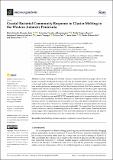Coastal Bacterial Community Response to Glacier Melting in the Western Antarctic Peninsula
Author(s)
Alcamán-Arias, María Estrella; Fuentes-Alburquenque, Sebastián; Vergara-Barros, Pablo; Cifuentes-Anticevic, Jerónimo; Verdugo, Josefa; Polz, Martin; Farías, Laura; Pedrós-Alió, Carlos; Díez, Beatriz; ... Show more Show less
Downloadmicroorganisms-09-00088.pdf (2.584Mb)
Publisher with Creative Commons License
Publisher with Creative Commons License
Creative Commons Attribution
Terms of use
Metadata
Show full item recordAbstract
Current warming in the Western Antarctic Peninsula (WAP) has multiple effects on the marine ecosystem, modifying the trophic web and the nutrient regime. In this study, the effect of decreased surface salinity on the marine microbial community as a consequence of freshening from nearby glaciers was investigated in Chile Bay, Greenwich Island, WAP. In the summer of 2016, samples were collected from glacier ice and transects along the bay for 16S rRNA gene sequencing, while in situ dilution experiments were conducted and analyzed using 16S rRNA gene sequencing and metatranscriptomic analysis. The results reveal that certain common seawater genera, such as <i>Polaribacter</i>, <i>Pseudoalteromonas</i> and HTCC2207, responded positively to decreased salinity in both the bay transect and experiments. The relative abundance of these bacteria slightly decreased, but their functional activity was maintained and increased the over time in the dilution experiments. However, while ice bacteria, such as <i>Flavobacterium</i> and <i>Polaromonas</i>, tolerated the increased salinity after mixing with seawater, their gene expression decreased considerably. We suggest that these bacterial taxa could be defined as sentinels of freshening events in the Antarctic coastal system. Furthermore, these results suggest that a significant portion of the microbial community is resilient and can adapt to disturbances, such as freshening due to the warming effect of climate change in Antarctica.
Date issued
2021-01-01Department
Massachusetts Institute of Technology. Department of Civil and Environmental EngineeringPublisher
Multidisciplinary Digital Publishing Institute
Citation
Microorganisms 9 (1): 88 (2021)
Version: Final published version